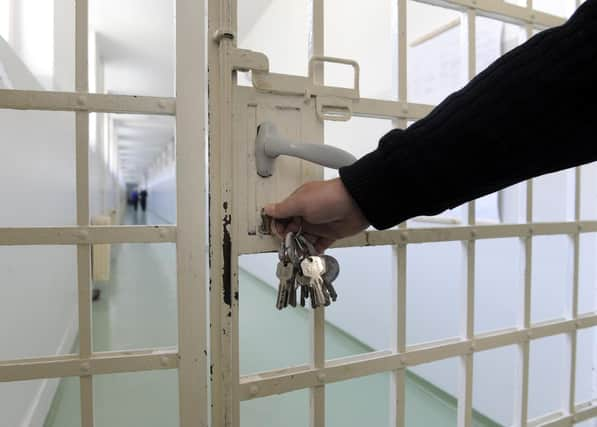Ian Ellis: Harsher prison sentences will not necessarily make society safer - it might in fact lead to increased crime


Will we as individuals, and as humanity, do any better than we did in the year that is now past?
That, of course, is up to us.
However, changing one's ways requires effort, and changing the ways of society as a whole is a challenge of even greater proportions because it requires changes in the ways countless individuals think and in the attitudes they adopt.
It is, in fact, about changing culture itself.
Advertisement
Hide AdAdvertisement
Hide AdMy own experience with new year resolutions has not been anything to write home about, but that is not to say that I have never changed anything in the way I do things.
Without doubt, of central importance in making changes is to think them through clearly and to be really aware of the purpose of the change. It is about being truly intentional.
New year resolutions are all about making changes for the better.
People can and do change, and individuals should accept that change is possible in others. Giving up on others because 'they will never change' is not only pessimistic but is also quite unfair.
Advertisement
Hide AdAdvertisement
Hide AdIn the course of my ministry in the church I have had occasion to visit in prisons.
First, it was as an assistant chaplain to what used to be the women's prison in Armagh, and later there were a few times when parishioners had to be visited in prison.
Does prison change people for the better? How successful is the prison system in actually rehabilitating offenders?
Many prisoners do end up returning to prison for committing an offence after being released, but it need not be that way.
Advertisement
Hide AdAdvertisement
Hide AdContrary to what many people tend to assume, alternatives to incarceration and the provision of less austere conditions in prisons have been shown to reduce reoffending in particular.
In a well researched article for YouGov, veteran broadcaster John Humphrys, definitely no 'softie', has recently written: “Someone sent to prison, even for a short time, may very well lose their job and possibly their home and face mounting debts they have no hope of repaying.”
Indeed, add to those woes the damage imprisonment can do to marriages and family life.
The extent of disruption of individuals' lives as a result of imprisonment, Mr Humphrys writes, is such that they may feel they have no option but to turn to crime again, adding: “We have some of the highest reoffending rates in western Europe. So the argument that we lock people up to deter them from a life of crime begins to look a little thin.”
Advertisement
Hide AdAdvertisement
Hide AdThe broadcaster notes how The Times writer Alice Thomson has pointed out, from an England and Wales perspective, that ten years ago the judiciary and police agreed, unheralded, to send fewer under-18s to young offenders’ institutions and that since then offending rates for 10 to 17-year-olds have fallen by 79 per cent.
Ms Thompson also has indicated that Germany made the same decision for adults 30 years ago and that during the time since then the German prison population has fallen by almost 32 per cent, with crime rates having stabilised, while the figure for England and Wales has doubled.
Mr Humphrys pointed out that Norway has the lowest reoffending rate in Europe, adding: “They also have what many would regard as the cushiest jails.”
Last summer, the Northern Ireland Audit Office, commenting on the report 'Reducing Adult Reoffending in Northern Ireland', released by Northern Ireland’s Comptroller and Auditor General, Dorinnia Carville, stated that our criminal justice system “needs to adopt a more targeted, strategic approach if levels of adult reoffending are to be significantly reduced”.
Advertisement
Hide AdAdvertisement
Hide AdThe report indicated that approximately 77 per cent of those sentenced to custody in Northern Ireland receive prison sentences of 12 months or less, with reoffending rates for these individuals currently being approximately 52 per cent.
This in turn raises the subject of prisoners on remand, involving prisoners awaiting trial.
On this aspect of the matter, the Audit Office commented that the proportion of prisoners held on remand has risen sharply in recent years and is now much higher in Northern Ireland compared with Scotland and with England and Wales (together) – that is, 37, 25 and 17 per cent respectively.
The Audit Office added that “while other jurisdictions have introduced a variety of bail initiatives providing the judiciary with viable alternatives to remand, none of these [has] been implemented in Northern Ireland”.
Advertisement
Hide AdAdvertisement
Hide AdA Department of Justice spokesperson told me for this column that a working group is currently considering “a number of options” as alternatives to remand within Northern Ireland's prisons, including electronic monitoring, but added that the introduction of new measures “will be subject to securing necessary additional resources”.
What society surely needs from the justice system is protection from violent offenders, a deterrence to crime, and low rates of reoffending – that is, a change in behaviour from criminal tendencies to a law-abiding life.
It can happen, but any idea that the harsher society is on offenders the better for us all is just not borne out by the aforementioned statistics.
People very often need help to change, and that includes offenders.
• Canon Ian Ellis is a former editor of The Church of Ireland Gazette